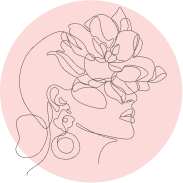
Acne can have a negative impact on an individual’s self-esteem and emotional well-being, particularly when it is severe or persistent.
While it commonly affects teenagers during puberty, acne can also affect adults of all ages.
Atopic dermatitis is the predominant form of eczema, which is a skin condition characterized by persistent itching and the development of red patches, typically found on the face, arms, and legs. Although it primarily affects children, it is important to note that it also impacts a significant number of adults, with an estimated 18 million individuals affected.
The hallmark of atopic dermatitis is its cyclical nature, wherein the rashes tend to flare up, subside, and then reappear periodically. This pattern of flare-ups and remissions can vary in frequency and severity among individuals. During flare-ups, the affected skin may become intensely itchy, leading to scratching, which can further exacerbate the condition.
The primary cause of acne is the overproduction of sebum, an oily substance produced by the sebaceous glands in the skin. When sebum combines with dead skin cells and bacteria, it can clog hair follicles and lead to the formation of acne lesions. Hormonal changes, particularly during puberty, play a significant role in acne development, as they stimulate the sebaceous glands to produce more oil.
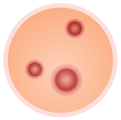
These are small, red, and raised bumps on the skin. They occur when the walls of the hair follicles become inflamed due to bacteria and other factors. Papules can be tender to the touch.
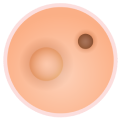
Nodules are larger, solid, painful bumps beneath the skin’s surface. They develop deep within the skin and can be quite tender. Nodules often take longer to heal and may leave scars.
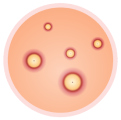
Similar to papules, pustules are also inflamed and appear as small bumps on the skin. However, they contain pus, which gives them a white or yellowish ppearance at the center.
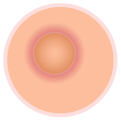
Cysts are the most severe form of acne and are large, pus-filled, painful lesions that are deeply embedded in the skin. They can cause significant inflammation and may lead to scarring.
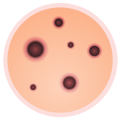
These are non-inflammatory acne lesions and can be open (blackheads) or closed (whiteheads). Blackheads occur when the pore is open, and the trapped sebum nd dead skin cells oxidize, giving them a dark appearance. Whiteheads, on the ther hand, form when the pore is closed, causing the trapped sebum and dead skin cells to remain beneath the skin’s surface.

Acne can have a negative impact on an individual’s self-esteem and emotional well-being, particularly when it is severe or persistent.
While it commonly affects teenagers during puberty, acne can also affect adults of all ages.
These are applied directly to the skin and include over-the-counter products with ingredients like benzoyl peroxide, salicylic acid, or sulfur. Prescription-strength topical medications may contain retinoids, antibiotics, or a combination of ingredients to help reduce acne-causing bacteria, unclog pores, and control inflammation.
Some individuals may benefit from a combination of topical and oral medications to effectively manage acne. This approach targets multiple causes of acne, such as bacteria, inflammation, and excessive oil production.
In cases of moderate to severe acne, oral medications may be prescribed. Antibiotics, such as tetracycline or erythromycin, can help reduce inflammation and kill bacteria. Oral contraceptives or anti-androgen medications may be recommended for females with hormonal acne. Isotretinoin, a powerful medication derived from vitamin A, is reserved for severe and resistant cases of acne.
These exfoliate the skin and unclog pores, reducing acne breakouts. Microdermabrasion: This procedure uses a handheld device to gently remove the outer layer of dead skin cells, improving the appearance of acne scars and reducing the risk of clogged pores.
Certain types of light therapy, such as blue light or red light, can help kill acne-causing bacteria and reduce inflammation.
Inflamed acne cysts or nodules can be injected with a diluted corticosteroid to quickly reduce inflammation and promote healing.
Dermatologists can perform a manual extraction to remove certain types of acne lesions, such as blackheads or whiteheads.
Laser acne treatment targets and treats acne-prone skin using specific wavelengths of light. The lasers deliver concentrated energy to affected areas, reducing inflammation, killing acne-causing bacteria, and shrinking sebaceous glands (Aviclear) that produce excess oil.
As the skin absorbs the laser energy, it penetrates deep into the layers where acne develops. This process stimulates collagen production, rejuvenates the skin, and improves texture while minimizing acne scars.
Fractional laser treatment creates microscopic columns of thermal damage, triggering the growth of new, healthy skin cells and remodeling collagen.
Pulsed dye lasers focus on blood vessels, reducing redness and inflammation linked to acne breakouts.
Aviclear directly targets and shrinks sebaceous glands, offering a long-term acne solution. A complete treatment requires three sessions to achieve maximum effectiveness.
When it comes to treating acne, it’s important to adopt a comprehensive approach that includes both lifestyle
changes and targeted skincare practices. Here are some recommendations for treating acne:
Cleanse your face
twice a day
Use a gentle, acne-specific cleanser to keep your skin clear. Avoid harsh scrubbing—it can worsen irritation. Opt for cleansers with salicylic acid or benzoyl peroxide to unclog pores and fight acne-causing bacteria.
Maintain a
healthy diet
While there is no direct evidence linking diet to acne, some studies suggest that certain foods, such as high-glycemic-index foods and dairy products, may exacerbate acne in some individuals. It can be helpful to experiment with your diet and identify any triggers that worsen your acne.
Avoid touching
your face
Keep your hands away from your face to prevent transferring bacteria and oils from your hands onto your skin. Picking or popping acne lesions can lead to inflammation and scarring.
Manage
stress
Stress can contribute to hormonal imbalances, which can trigger acne breakouts. Engage in stress-reducing activities like exercise, meditation, or hobbies that help you relax.
Use non-comedogenic
products
Choose skincare and cosmetic products labeled as “non-comedogenic” or “oil-free.” These products are less likely to clog your pores and contribute to acne breakouts.
Over-the-counter
treatments
Consider using over-the-counter acne treatments containing ingredients like benzoyl peroxide or salicylic acid. These ingredients can help reduce inflammation and unclog pores. Start with lower concentrations to avoid excessive dryness or irritation, and gradually increase if needed.
Moisturize
appropriately
Even if you have oily skin, it’s essential to use a lightweight, oil-free moisturizer to keep your skin hydrated. Look for products that are labeled as “non-comedogenic” or “oil-free.”
Consult a
dermatologist
If your acne is severe, persistent, or causing emotional distress, it’s advisable to seek professional help. A dermatologist can assess your specific situation and recommend appropriate prescription medications, such as topical retinoids, antibiotics, or hormonal therapies.
Avoid excessive
sun exposure
While limited sun exposure can have a temporary positive effect on acne, excessive sun exposure can lead to skin damage and inflammation. Protect your skin by wearing sunscreen with an SPF of 30 or higher and by seeking shade when the sun is strongest.
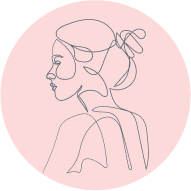
Remember!
Everyone’s skin is different, so it may take time and experimentation to find the right combination of treatments that work best for you.
Be consistent with your skincare routine, and don’t hesitate to seek professional advice when needed.